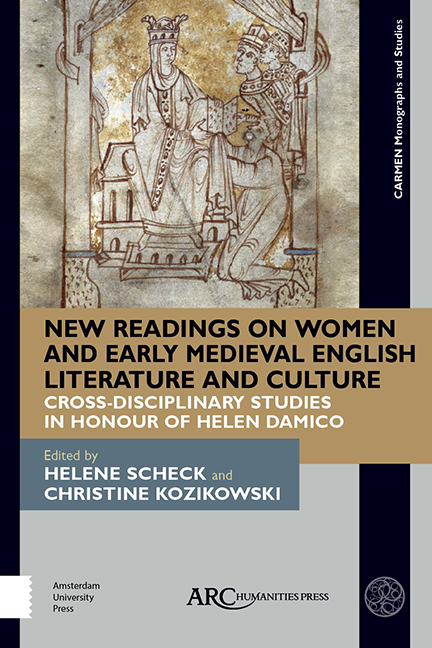 New Readings on Women and Early Medieval English Literature and Culture
New Readings on Women and Early Medieval English Literature and Culture Book contents
- Frontmatter
- Contents
- List of Illustrations
- List of Abbreviations
- Note from the Editors
- Introduction: Feminism and Early English Studies Now
- PART ONE LITERACY AND MATERIAL CULTURE
- PART TWO ENGENDERING MARRIAGE AND FAMILY
- PART THREE WOMEN OF THE BEOWULF MANUSCRIPT
- PART FOUR WOMEN AND ANGLO-SAXON STUDIES
- Select Bibliography
- Index of Manuscripts
- General Index
11 - Listen to the Woman: Reading Wealhtheow as Stateswoman
Published online by Cambridge University Press: 20 November 2020
- Frontmatter
- Contents
- List of Illustrations
- List of Abbreviations
- Note from the Editors
- Introduction: Feminism and Early English Studies Now
- PART ONE LITERACY AND MATERIAL CULTURE
- PART TWO ENGENDERING MARRIAGE AND FAMILY
- PART THREE WOMEN OF THE BEOWULF MANUSCRIPT
- PART FOUR WOMEN AND ANGLO-SAXON STUDIES
- Select Bibliography
- Index of Manuscripts
- General Index
Summary
There is also the possibility that she [Wealhtheow] is creating a new possibility; as she scrambles the circuits of language she may be speaking herself, “against the other and against men's grammar”
EVEN AS OLD English scholarship has turned its attention increasingly to the women of the poem we call Beowulf, and more particularly to Wealhtheow, the only woman in it given direct speech, its gaze has often emphasized (for want of a better word) the “emasculation” of female discourse. Alain Renoir, reading pathos into Wealhtheow's impressive series of imperatives, in 1975 wrote “one may surely be excused for detecting the hint of a pathetic ring in her attempt at clinching her request [to Beowulf] with the assertion that the warriors in the hall always do her bidding.” Fifteen years later Gillian R. Overing would write: “Wealhtheow's speeches offer a demonstration of the Lacanian assumption that language is our inscription into patriarchy.” But Overing, engaging with Wealhtheow's words as few except Helen Damico have done, is still uncomfortable with Damico's reading of a possibly privileged discourse, one whose power was not entirely dependent on the male, if only because Damico's approach seems to deny the ambiguities valorized by modern criticism.
Scholarly approaches to Wealhtheow can focus on a systematic muffling of her thought and performance through an imposition of patriarchal ideals and language by audience and poet, “the poetic tradition as passive, suffering victims,” or even her lonely position as the one, or nearly the only one, “powerful plot driving” woman in a “poem of single-minded masculinism.” These all may in different ways and from different perspectives under-read her and under-represent her influence in the poem and on the poem, concentrating too much on woman as victim rather than on woman as significant player, with influence beyond her admittedly brief appearances. Overing, Jane Chance, and Damico present, albeit in relatively different ways, a Wealhtheow who may, at least, struggle with the biases of the discourse and of the attitudes of the audience given her within the text. We should ask ourselves if we should engage, if only experimentally and tentatively, with Wealhtheow's presence as a possible reflection of the poet's expectation of an audience receptive to a woman's voice struggling against, or even rising above, the marginal and the victimized.
- Type
- Chapter
- Information
- New Readings on Women and Early Medieval English Literature and CultureCross-Disciplinary Studies in Honour of Helen Damico, pp. 191 - 208Publisher: Amsterdam University PressPrint publication year: 2019
- 1
- Cited by


